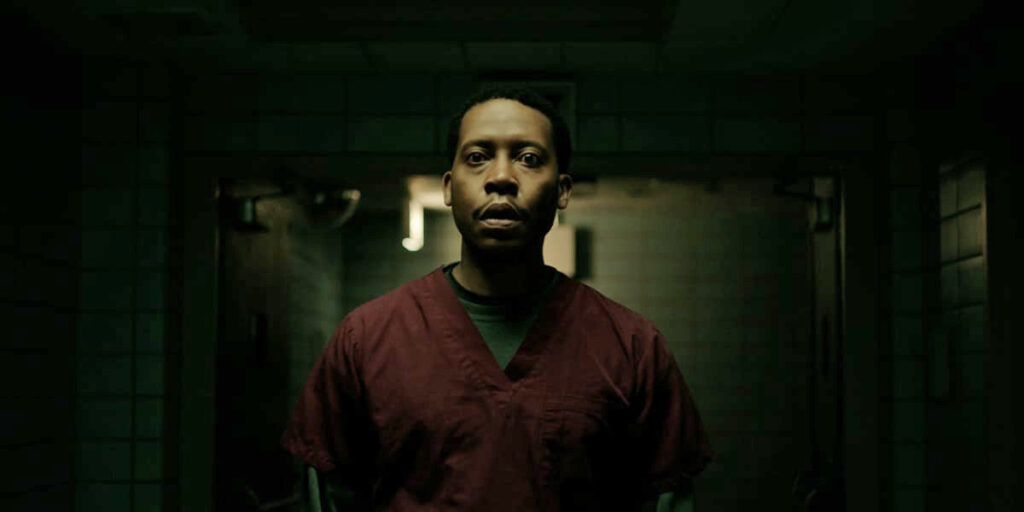While Rounding ’s lead performance and somber atmosphere somewhat salvage the film, they can’t overshadow how unevenly it incorporates its thriller elements.
Setting a psychological thriller in a hospital seems like a match made in heaven. With the often dreary, cold atmosphere and reminders of our physical frailty and mortality that hospitals often have around nearly every corner, the potential for a story that could truly shake a person to their core made Rounding a film I couldn’t pass up. Unfortunately, while this thriller has traces of that kind of amazing story I was hoping for, they’re not enough to overcome a lack of tonal identity or fleshed-out ideas that heavily compromises the entire experience. Directed by Alex Thompson, Rounding stars Namir Smallwood as Doctor James Hayman, who has transferred to a rural hospital after collapsing on the job due to a traumatic incident. He hopes to receive a fresh start and a chance at redemption, but it’s clear that he’s still damaged, as he has visible trouble connecting with patients. Soon, he meets young asthma patient Helen Adso (Sidney Flanigan), only to begin wondering if she has something greater than asthma, even questioning the intentions of her mother (Rebecca Spense). As he investigates Helen’s case, he becomes increasingly consumed with discovering the truth, all while being tormented by an ankle injury, nightmares, and demons from his past.
This all sounds thrilling, particularly with how it might be hard to tell whether James is a trustworthy protagonist all the way through, or someone whose obsession is a sign of something much darker within himself. If he’s the latter, how far will that darkness go, and what drastic consequences to himself or others will come from it? The biggest strength of Rounding is how it maintains that tension in its portrayal of James. He’s very sympathetic for how he’s clearly the shaken shell of the much more personable man he used to be. What little we see of his old self makes us root for him to find that again and makes his distant, disconnected, nervous personality harder to watch. As he becomes more and more invested in Helen’s situation, he also becomes gradually more unhinged in his search for some secret truth that may or may not even exist, and it’s clear as day how much of this is due to his own need for closure for the sins of his own past.
Where this all starts to fall apart, however, is with the film’s experimental choices that don’t really land for me. These include imagined scenes in James’s head, his perception of time being messed with, and most bizarrely of all, a freakish creature that he occasionally imagines himself being hunted by. I like these ideas in concept, but they don’t tie into James’s psyche in any meaningful way. Or, when they do, it’s a very basic connection. The thriller elements of Rounding feel like tagged-on additions for the sake of adding thrills, rather than extensions of the story that add to his character or the overall experience. (This is especially a shame because of how great the design and effects of the creature are.) They’re distractions more than anything else. Other traits of his, like his foot injury or him wearing shoes that are too small, don’t really mean anything to me either, and the film is peppered with ominous imagery that’s clearly supposed to signify something, but I couldn’t tell you what that is. Rounding often comes across like it’s trying way too hard to make itself a genre thriller, without really understanding what makes them so fascinating. It doesn’t seem to know what it wants to be, or at the very least how it wants to tell its story.
Helen herself is also not very well-developed. This is through no fault of Sidney Flanigan, who gives a great understated performance that, between Rounding and 2020’s Never Rarely Sometimes Always, makes me want to follow her budding career. She does the best she can with her limited screen time… but that’s the problem. Her screen time is so limited, and her relationship with her mother so thinly explored, that it’s hard to be invested in her, and by extension, James’s investigation of her. Rounding can get repetitive with its cycle of James insisting something’s wrong to his superior (Michael Potts), getting test results back, being scolded that he’s taking things too far, and lather, rinse, repeat. While James himself seems to slip in sanity, and Namir Smallwood’s performance evolves very effectively with that, the story he’s in and the characters he’s surrounded by don’t feel as developed, which unfortunately dulls the impact of the dramatic ending.
Technically and visually, Rounding is sound. Its performances are all solid and the very core of its ideas is done well enough to keep you at the very least moderately invested. I did tense up a few times and I wanted to know where everything was going, but I was never on the edge of my seat or deeply moved by anything. I can see and appreciate the clear efforts to experiment with the storytelling and explore the psychological depths of a damaged man, but the execution overall doesn’t quite stick the landing. Rounding is passable enough, but it’s not something that I can recommend for any reason other than curiosity.
Rounding premiered at the Tribeca Film Festival on June 9, 2022 and will be released in US theaters and on digital platforms on February 14, 2025.

